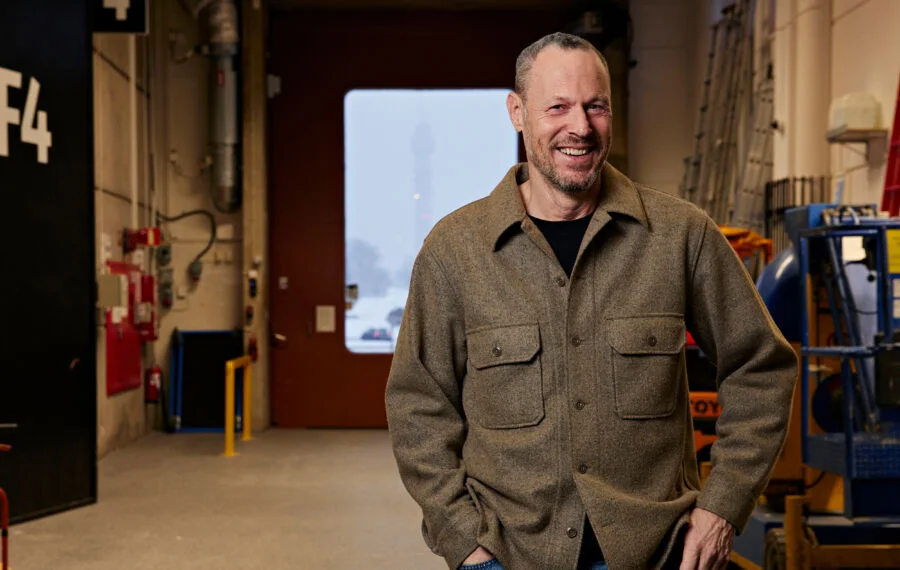
2023-12-05
From deepest seriousness to liberating laughter
After starting two advertising agencies and having a solid career as a copywriter and commercial director, Anders Tempelman decided to become a full-time screenwriter. We asked him to tell us about the upcoming costume comedy about Bernadotte’s road to the throne, blogging as a free zone and his top tips for those who also want to start writing for film.
You are currently working on a “costume comedy” about how Bernadotte came to the Swedish throne. Can you tell us more about that project ?
– It’s a feature film that director Johannes Stjärne Nilsson and I have been talking about for probably 10 years. The true story is so strange and stupid that we felt compelled to take on the theme of the randomness of power. Something that is still very relevant today. Now, thanks to support from the Swedish Film Institute, we have a first draft of the script and we are looking for a suitable producer.
The movie is set in a specific time period and is about real historical figures. How did you approach the research for the project?
– I have done a lot of reading to hear how the event is described by others. Including Lieutenant Carl Otto Mörner’s own book, he who actually traveled down to Paris and “found” Bernadotte. Then I have taken enormous liberties to make a good story even better. Already in the opening credits of the movie I declare “This is not a history lesson”. What I am most interested in portraying accurately (which rarely happens in movies or comics) is the true living conditions in Sweden at the time. The poverty, the dirt, the stench and the diseases.
Writer, copywriter and screenwriter. You have had many different roles during your career. How did you start writing and how has moving between advertising and film shaped your writing?
– I had a flair for language and I think several teachers encouraged my writing. The exception was a middle school teacher who called my mother to a meeting after I wrote an essay about a babysitter who got tired of the screaming child and threw it in the trash. Later in life, when I opened my eyes to the advertising industry, it seemed so obvious. So I became a copywriter early on and studied marketing at Berghs in the evenings. Then I was lucky and got to be there when commercial TV came to Sweden. It quickly became clear that I was very good at writing for moving images, which led me to train my skills with industry money. I also started directing my commercials. After a while, I realized that my true calling was probably in long-form drama and comedy. So 10 years ago, I completely changed my mind to pursue a career with worse financial conditions and unreasonably low chances of success.
You keep the noble art of blogging alive, sharing everything from traffic horrors in Italy, acidic scenes from various dinner tables and a frustrated, imaginary or real, conversation with the Minister of Culture. What topic will you tackle next?
– I’ve been blogging for ages and periodically have a large readership. So much so that I’ve even had my best blogs published in book form – “We’re not making a big deal of this”. The blog is my free zone where I can write whatever I want. I’m usually inspired by something that has actually happened or something I’ve thought about. I don’t have the time to blog as often anymore, but I let it be a bit more whim-driven and seize the opportunity when an idea pops up. So what the next topic is, I really don’t know.
On the same blog, you seem to welcome AI with relatively open arms. How will you spend your time when AI takes over?
– AI has already taken over as an image generator in my blogs and my work. Being able to visualize feature films, TV series or blogs is hugely time-consuming, while at the same time it can be absolutely crucial to give a sense of what I want to say. Not having to cut and paste images from American productions and instead creating my own unique images makes a big difference. I use AI instead of Google too, because it allows me to ask specific questions in a different way. “How did you go to the toilet in the castle in 1810?” So with AI, I get more time to write scripts instead and I will always be more original than AI on that.
On your website there is a quote from Jonas Åkerlund saying that he does not know where your dark and funny ideas come from. Do you have a good answer to that yourself?
– I have a style and tone in my writing that has perhaps always been there. I love comedy drama as a genre. Not the harmless, mainstream kind – but the one that dares to move seamlessly between deepest seriousness and liberating laughter. Ideas are really quite uninteresting, it’s the craft and the way you tell the story that makes all the difference.
What is your recommendation for people who want to take the plunge and start writing scripts themselves?
– There are many good books on dramaturgy that I could not have done without. Even if you are a good writer to begin with, you need to learn the structure behind movie storytelling. Some worth mentioning are “Story” by Robert McGee, “Writing Screenplays That Sell” by Michael Hague and “The Foundations of Screenwriting” by Syd Field. I can also highly recommend attending one of the courses that internationally renowned Scriptdoctors sometimes hold in Sweden.
What is it like to work from the Film House?
– Wonderful! I often meet colleagues in the house and the office part itself works perfectly for me. I never thought I could write in an open plan office, with good headphones it’s like I have my own little writing room.
